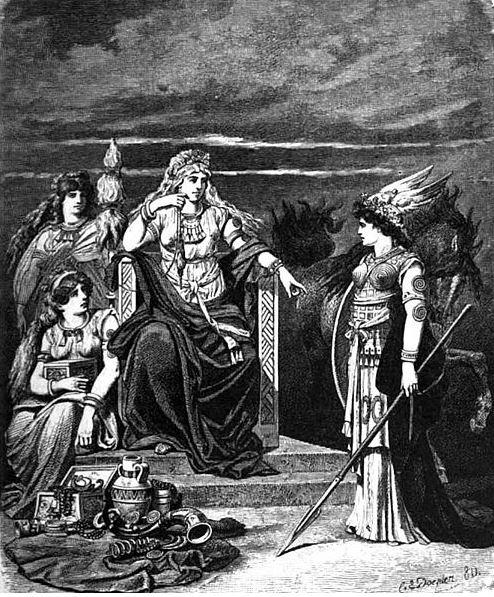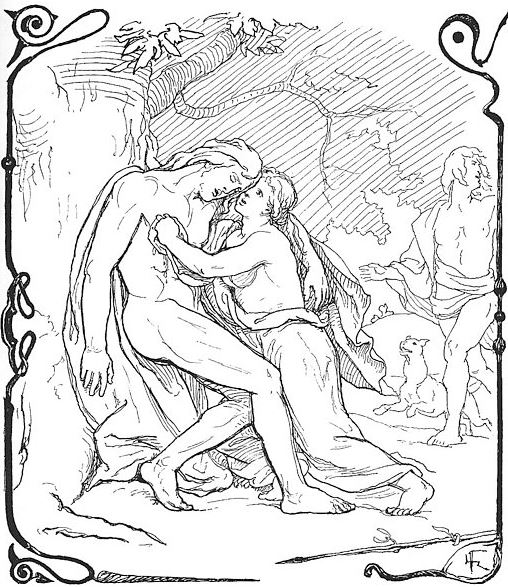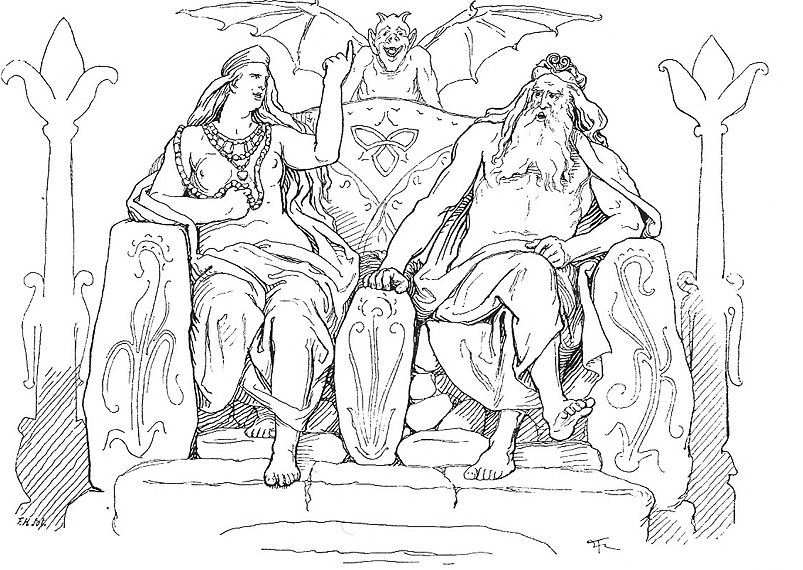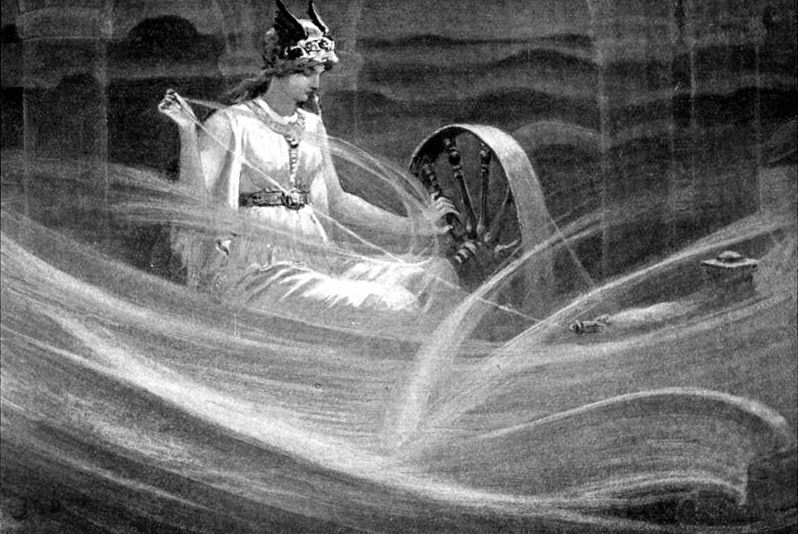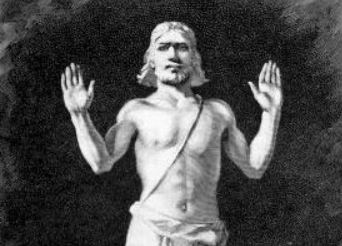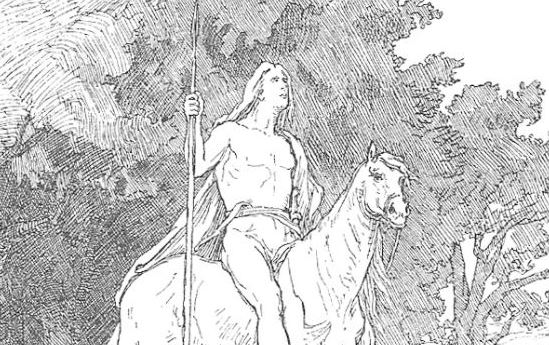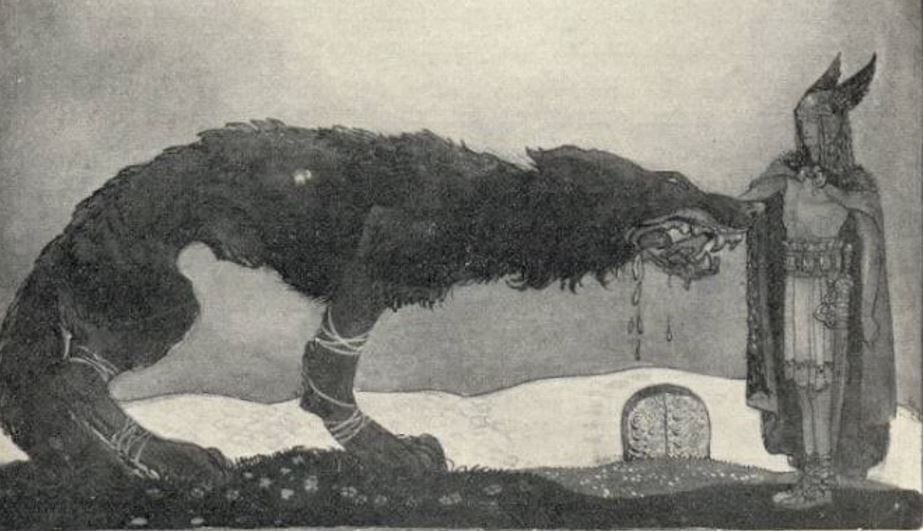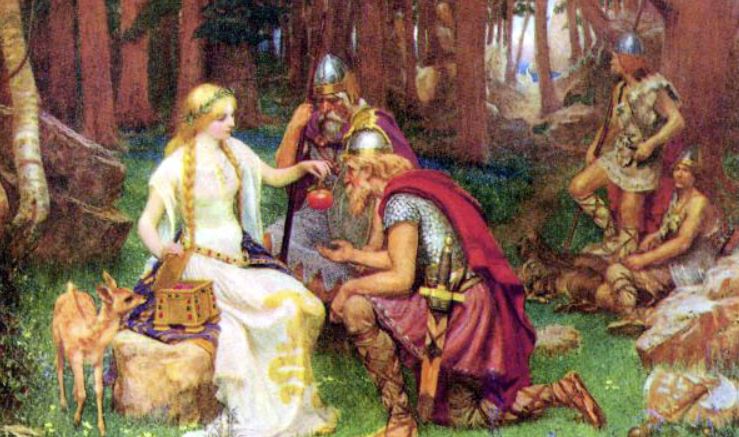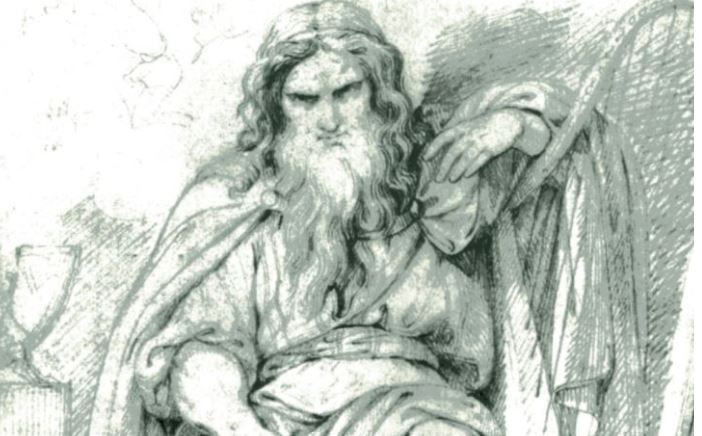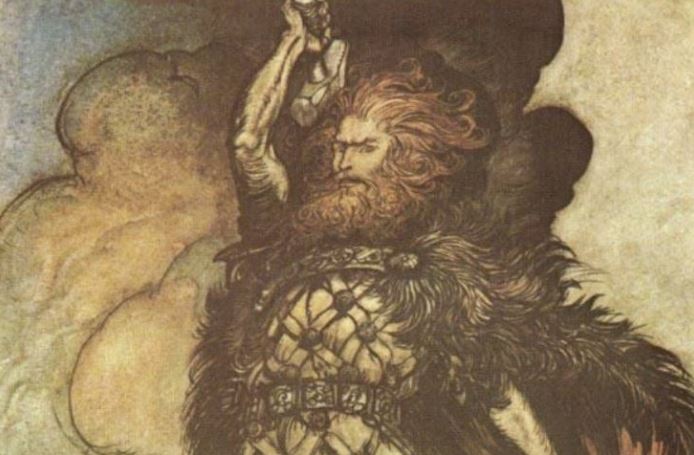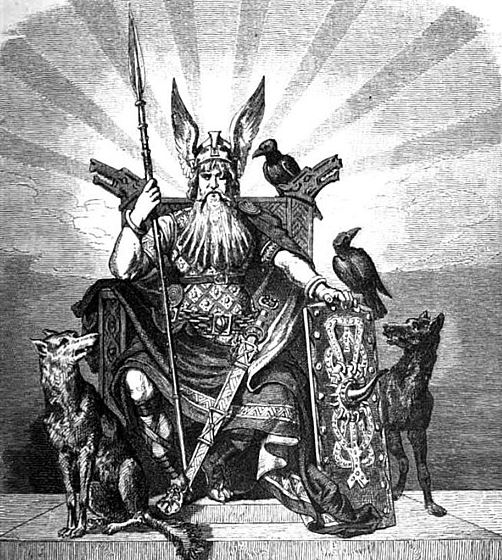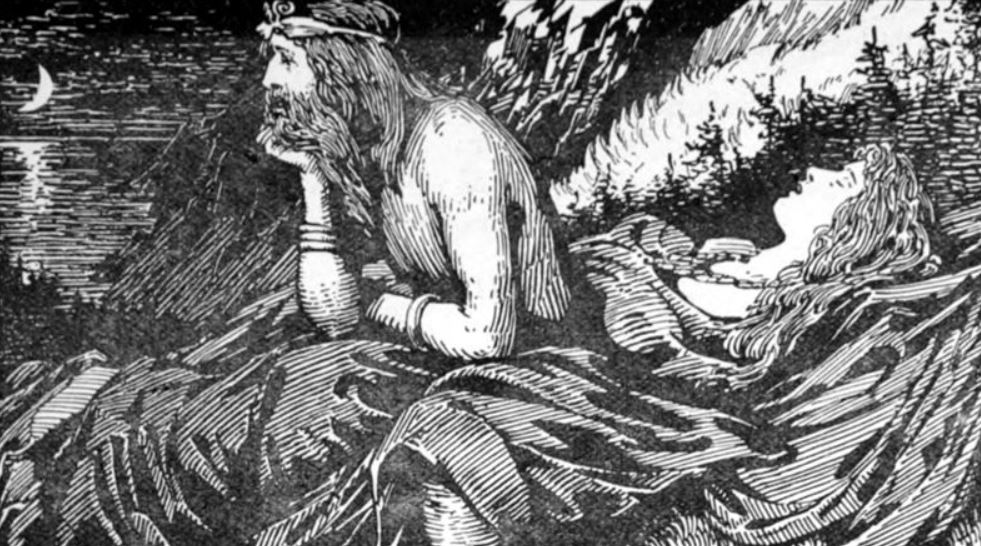Norse Goddess Frigg, The Beloved Goddess
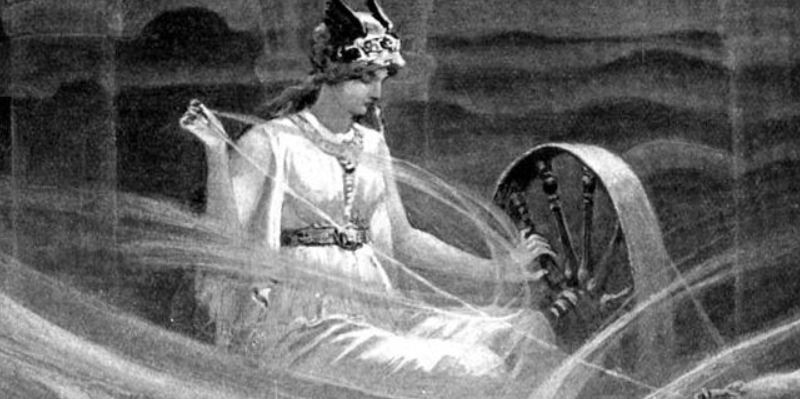
In Norse mythology, the Norse goddess Frigg is associated with the goddesses Friia, Frigga, or Freya.
The matriarch or Norse mythology, the Norse All-Father Odin and Frigg were husband and wife and both parents of Baldr.
What is Frigg the goddess of?
The Norse goddess Frigg is the goddess of fertility, love, home, marriage, and wisdom.
Frigg shares characteristics and behaviors relatable to Hera and Isis from Greek and Egyptian mythology.
A supporter of marriage and fertility, the Norse goddess Frigg is depicted as a sad, crying, loving mother, who weeps because she failed to save her son’s life.
Norse goddess Frigg: Meaning of her Name
The name Frigg is derived from the Proto-Germanic noun Frijj; meaning beloved or free.
Most everyone’s favorite day of the week, Friday, mean’s Frigg’s Day.
Spellings and supporting documents are lacking when it comes to information about Norse mythology. Fortunately, there is still enough information preserved to share the myths of Frigg.
The History of the Norse goddess Frigg
The origin myth of Frigg begins with her birth directly from Mother Earth.
At times the Norse goddess Frigg was depicted as having questionable morals in mythology. Frigg is most often portrayed as a prophetic, clairvoyant wife and mother, who lives in the wetland halls of Fensalir.
In Norse mythology, Fensalir is discussed in the Poetic Edda, which was transcribed in the 13th century from older sources, and the Prose Edda written in the 13th century by Snorri Sturluson.
Scholars share different theories about the location. Some associate Fensalir with a place of worship filled with springs, swamps, and or bogs. Others suggest it has a connection to Saga, another Norse goddess that resides in Skkvabekkr, another water-based location.
The norse goddess frigg sitting in her throne
The Norse goddess Frigg myths
The husband of Frigg, Odin, fathered several children with other goddesses and even a few with a giantess.
However, Odin and Frigg shared three sons: Hermod, Baldr, and Hodr.
The sons of the Viking goddess Frigg
Hermod was the son of Odin and Frigg that was the equivalent of Hermes from Greek mythology. However, one of the sons was favored over the others, and that was Balder. The third son of Odin and Frigg was the blind god, Hodr.
The reason why Baldr was the preferred son of Odin and Frigg was that Balder was considered the god of the sun, symbolizing bravery and nobility.
Baldr was handsome and fair, but a dark fate loomed overhead: they both have dreamt about Balder’s death. Knowing her son’s fate, the Norse goddess Frigg did everything in her power to save her son from his impending doom.
The efforts of Frigg in saving her son
The Viking goddess Frigg made him invincible in both worlds, Midgard (the human realm) and Asgard (the god’s realm). The Norse goddess Frigg called upon everything in both realms by name and demanded they sign an oath to never harm Baldr.
Mythology explains that the goddess Frigg contacted every material from both worlds, but sadly forgot about mistletoe, which became Baldr’s Achilles Heel.
Being the trickster that he was, the god of mischief and chaos Loki could not contain himself and had to meddle with his weakness. At one of the celebratory feasts of the gods, Loki gave Baldr’s blind brother Hodr, a spear made from mistletoe.
Hodr could not see what it was and followed Loki’s suggestion to toss the spear at Balder, killing his brother. Symbolically, this event represented the beginning of the end for all of the Norse gods and goddesses, the Ragnarok.
The viking goddess Frigg crying the death of her son balder
The relationship between Odin and Frigg
Lessons can be taken from the relationship of Odin and Frigg.
The pair had many arguments and were far from perfect, but were still considered an exemplary couple.
In this myth, there was a war between the Vandals and the Winnilers, two powerful Germanic tribes. The husband of Frigg, Odin felt that the Vandals were the better tribe and should be the winners of the battle, however, the Norse goddess Frigg opposed Odin’s opinion and felt that the Winnilers were the tribe that deserved the victory more.
Deciding to sleep on it and settle the disagreement in the morning, whoever Odin woke to see first would be the winner of the battle.
The husband of Frigg, Odin was confident with this solution, knowing he would see the Vandals first because they were clearly visible from his side of his shared bed with the Norse goddess Frigg.
However, Frigg tricked her husband by sneaking out after Odin had fallen fast asleep to tell the women of the Winniler tribe to their chins impersonating the appearance of a beard and when she returned to bed, she turned the bed so that Odin would be on the opposite side upon rising.
He saw the Winniler tribe first and kept his promise, awarding the Norse goddess Frigg’s choice as the victors.
Odin and Frigg
The Power of the Norse goddess Frigg
Frigg was the most powerful Norse goddess
The Norse goddess Frigg possesses the power of prophecy and was capable of altering fates based on her prophecies.
The beloved mother of Asgard. Frigg was a well-known volva, which is a practitioner of seidr magic, a feminine power of foresight in Norse mythology.
The Viking goddess Frigg could foresee someone’s fate and influence that fate with their will and power of intent.
Seidr practitioners are believed to have the power to change life events. However, the Norse goddess Frigg could not alter the fate of her son Balder’s death and the end-of-days for the Norse gods and goddesses, referred to as Ragnarok.
Frigg goddess Symbols and their Meaning
Frigg is a Norse goddess of equal power to her husband, Odin.
Frigg is often regarded as a beloved queen of the gods and her origin began from Mother Earth. Symbolic of motherhood and home, the Norse goddess Frigg is wise and beloved by her followers.
Even though her marriage to Odin was less than faithful or worthy of being considered exemplary, Frigg was still a symbol of motherhood and stable family bonds.
Frigg goddess symbols: the foresight
More significant symbolism can be based on her power of foresight and the problems that revolve around tempting and altering fate.
Showing the imperfections of foresight help humans to understand that some things cannot be changed and what will be, will be, naturally, and cannot be changed or influenced.
Another example, Odin has the information needed to prevent his death, but also succumbs to his inevitable fate no matter his attempts to prevent it.
A representation of the Norse goddess Frigg represented weaving because of her powers as a volva
Additional facts about the Norse goddess Frigg
There is little to no preserved mythology of legends recanting the trials and tribulations of the Viking goddess Frigg, but dating back to the 18th, 19th, and 20th centuries, there are several artistic and literary references that leave much to be interpreted about Frigg.
A fun fact about Frigg…In a webcomic, called Brat-halla, Frigg plays an important part in the comic with her husband, Odin, and their children. Marvel also portrays Frigg in the Thor comics. Rene Russo plays the goddess Frigg in the movie about Marvel’s character, Thor.
Frigg and Freya
There are many shared characteristics between the two goddesses Frigg and Freya and sometimes it is said that they were both the same goddess. The truth is, it is not known for sure because of the lack of evidence left by these people.
What we do know is for the Aesirs, Frigg is the major goddess, while for the Vanir it is Freya.

